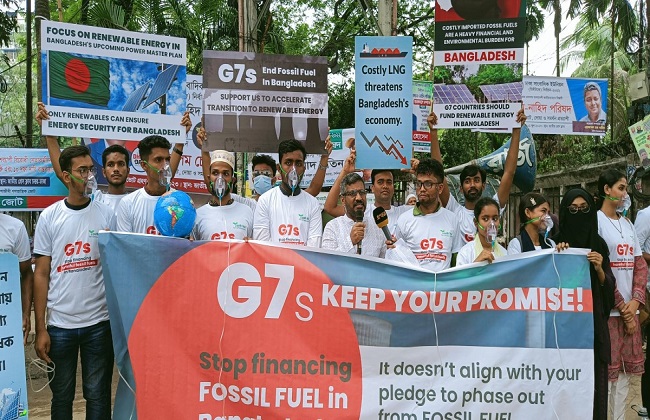
Youth activists in Bangladesh have called on global leaders from G7 countries to immediately halt the financing of fossil fuel-based power projects and prioritize investments in renewable energy.
During a climate strike held Today (19th May) in front of the National Press Club in the capital, Fridays for Future Bangladesh and YouthNet for Climate Justice pledged to end fossil fuel financing and reduce the country’s dependence on fossil fuel imports, primarily liquefied natural gas (LNG).
Speakers said Oxfam’s latest analysis reveals that the Group of Seven (G7) nations have an outstanding debt of $13.3 trillion (€12.3 trillion) to low- and middle-income countries in unpaid aid and funding for climate action.
This urgent plea comes ahead of the 49th G7 Summit, scheduled to take place on May 19–21, 2023, in Hiroshima, Japan. The summit will address regional and global crises, including the pressing climate crisis.
“Bangladesh, as a developing country, is deeply concerned about the transition to renewable energy and urges developed nations to sever their ties with fossil fuels,” they said.
In their passionate plea, the youth activists also emphasize the importance of loss and damage financing while cautioning against false solutions such as hydrogen and ammonia.
Bangladeshi youth activists demand that the G7 countries prioritize energy security and clean energy, particularly by refraining from investing in fossil fuels within Bangladesh and by providing support for renewable energy financing.
They shed light on the existing ambiguity, delays, and instability surrounding discussions on fossil fuel and renewable energy financing within the G7.
Unfortunately, commitments from member countries are currently stagnant or even moving in opposite directions, youth activists opined.
The passionate youth of Bangladesh call upon critical stakeholders to address the electricity crisis in their nation, highlighting the detrimental consequences of importing expensive fossil fuels like LNG, which burden the country financially.
They further emphasize the compounding challenges posed by escalating living costs, inflation, and frequent power outages. Their strong advocacy for a higher proportion of renewable energy in the new power sector master plan aims to ensure national energy security and promote equitable transitions.
In addition, the Bangladeshi youth demand that developed nations adhere to the Paris Agreement, strictly limit the global temperature increase to 1.5 degrees Celsius, and discourage multinational corporations from investing in fossil fuel power generation, thereby reducing harmful carbon emissions.
Sohanur Rahman, Executive Coordinator of YouthNet for Climate Justice, declares, “We cannot afford to wait for tomorrow to realize the urgent need to phase out harmful and expensive fossil fuels. The time for action is now.’’ He added, The world is already suffering from the climate and energy crisis, and substantial investments in renewable energy and fair compensation from global leaders like the G7 nations are imperative. We cannot afford any further delays; they must awaken to the urgency of this moment.”
The young activists also emphasize the need to substantially increase global commitment to climate financing, advocating for an annual commitment of $100 billion, with at least 50 percent allocated specifically for renewable energy financing.
Furthermore, they firmly demand that G7 countries, including Japan, refrain from imposing untested, debatable, and expensive technologies like hydrogen fuel and ammonia upon developing nations like Bangladesh.
Prof. Dr. Ahmad Kamruzzaman Majumder, Chairman at the Center for Atmospheric Pollution Studies (CAPS), adds, “We must act promptly to combat climate change and curb air pollution, for there are two interrelated challenges. Let us unite as individuals, businesses, and financial institutions to facilitate investments in renewable energy and pave the way toward a sustainable future. Each breath we take and every heatwave we endure is a stark reminder of the urgent need for action.”
Prof. Saleemul Huq, COP28 President’s adviser and Director of the International Centre for Climate Change & Development (ICCCAD), asserts, “The climate crisis is not a distant threat confined to the future; it is already wreaking havoc on vulnerable communities in Bangladesh and worldwide, despite their minimal contribution to its creation.” “It is high time for wealthy nations and fossil fuel corporations, the main culprits, to take responsibility and compensate for the damage they have caused, ensuring a just and sustainable future for all. We owe it to our children and grandchildren to act decisively now before it is too late,” he added

